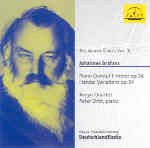The outer movements of Brahms’ monumental Piano Quintet fare best in the Auryn Quartet’s collaboration with pianist Peter Orth, where the music’s polyphonic rigor and surging passion fuse in forward-moving tandem. The players meet with less success in the slow movement. Here the delicate string accompaniments seem threadbare and unfocused compared to the Guarneri Quartet’s firm underpinnings for Rubinstein (RCA) and Peter Serkin (Philips), with tempo fluctuations that get in the way of the music’s lyrical flow. The piano is slightly recessed in the mix, rendering indistinct the crucial pizzicato cello and piano interplay in the Scherzo.
Like his one-time teacher Rudolf Serkin, Orth achieves effortless transitions and perfectly gauged tempo relationships throughout Brahms’ Handel Variations, altering the repeats with discreet adjustments in voicing and color. Orth may lack Serkin’s ironclad linear projection, Stephen Kovacevich’s energizing accents and rhythmic vitality, or Julius Katchen’s outward panache, but there’s no question that Orth’s masterful pianism and honest musicianship merit respect and consideration.
































